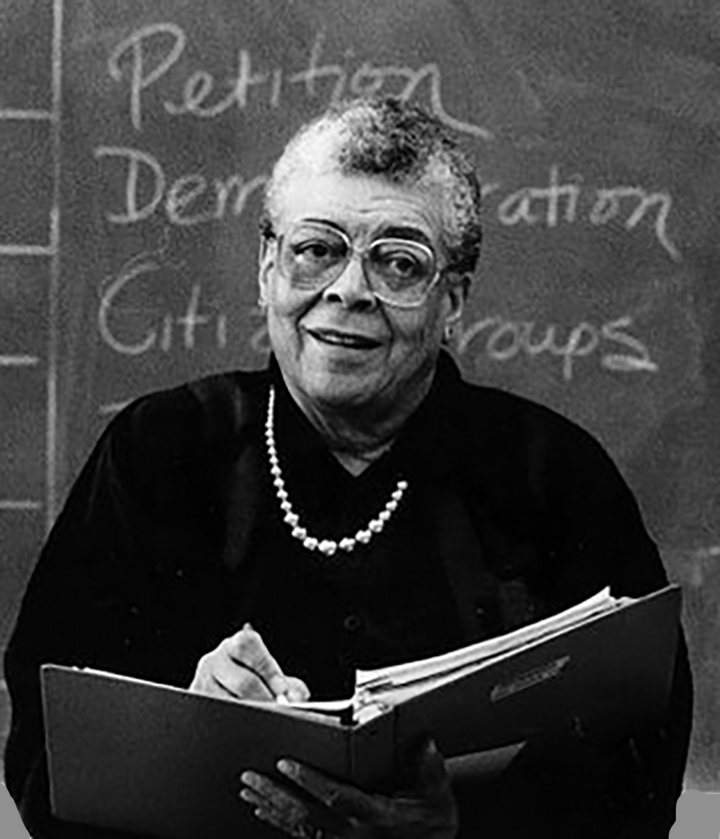Spokane Public School District 81 is looking for nominations for names of new schools and buildings. We nominated Frances Scott for the new middle school in NE Spokane on Foothills Drive. We also nominated Ruben Trejo (see the link) for the new building for the On Track Academy located on the Shaw Campus.

Frances Scott 1921 – 2010
Scott was one of Spokane’s remarkable people – the city’s first African-American woman attorney, a teacher at Rogers High School for more than 30 years, a president of the Spokane Education Association and a president of the Washington State University Board of Regents.
She was also a forceful and stalwart leader in the local civil rights movement, which helped drag a recalcitrant Spokane toward equality. She believed in nonviolence, but don’t confuse that with meekness.
Listen to Scott in a 1982 talk: “We must exercise some degree of militancy … against slumlords, against Klansmen, against people who want no minorities in their neighborhoods, against racist textbooks and against politicians who thrive on bigotry. Otherwise, people will say in the future, ‘You were there. What did you do about it?’ ”
She grew up during the 1920s and 1930s, especially tough times for a black person aspiring to be a professional in Spokane.
When Scott was a student at Marycliff High School in the late 1930s, she and some of her high school friends went to the Davenport Hotel to interview the famous opera star Marian Anderson for the school paper.
The Davenport made Scott ride in the freight elevator.
“My white friends – bless their hearts – decided if I had to ride the freight elevator, they would, too,” she later said.
They couldn’t find Anderson’s room – for good reason. Anderson was black and the Davenport was lily-white in those days. The girls eventually found Anderson in a small hotel nearby.
Scott spoke often of the time when, as a girl, she had to have her appendix removed at a Spokane hospital. The hospital gave her a private room – but only so a white patient wouldn’t have to share.
“I suppose that was one of the advantages of being black,” she said, dryly. “But it was humiliating when you realize why I got the room to myself.”
She graduated from Marycliff and went on to Holy Names College. She married W. Vernon Scott, a Spokane chiropractor, while still in college – and that didn’t go over well with the nuns at Holy Names.
“The good nuns put her out because she married a divorced man in her senior year,” said her sister, Ruth Nichols, of Spokane.
Undeterred, Scott finished her degree at Whitworth College (now University) and then went on to get a master’s degree in education. This was 1958 – a time when the Spokane School District had only four black teachers, up from zero in 1950.
She was hired at Rogers because “my credentials were good enough for them to hire me without doing me a favor.” She would teach English and German there for more than three decades.
She was 54 when she decided to take on another academic challenge.
“She wanted her son to go to law school,” Nichols said. “And we all said, if you want a lawyer in the family, you should go yourself.”
So she did. She graduated from the Gonzaga University School of Law in 1979 – and became Spokane’s first African-American woman attorney. When she was sworn in to the bar, she said, “I want to be able to instruct, as well as represent, minority people in their dealings with the law.”
She went on to practice law on the side, taking mostly civil rights and pro bono cases, while still keeping her Rogers teaching job.
Scott soon found her law degree handy in an entirely new arena. In 1981 she was elected president of the teachers union, the Spokane Education Association. Her election was notable for at least one reason: She had been one of the few teachers to cross picket lines in a 1979 strike. She was able to convince her fellow teachers that she had been bound, as an attorney, to obey a court injunction that had ordered teachers back to work. She remained president of the union until 1983.
She was also deeply involved in the Spokane branch of the NAACP, in the Democratic Party and at Holy Trinity Episcopal Church.
Excerpted from Distinguished Woman Left Us a Legacy by Jim Kershner.
The Spokesman Review Sat. Oct. 23 2010

Mrs. Scott JD was inspirational to me, not only in her work for civil rights but in her strength to continue her education at all stages of her life.
So proud of this and other Black women my roots hail from there and I now have a Ph.D teaching in California.